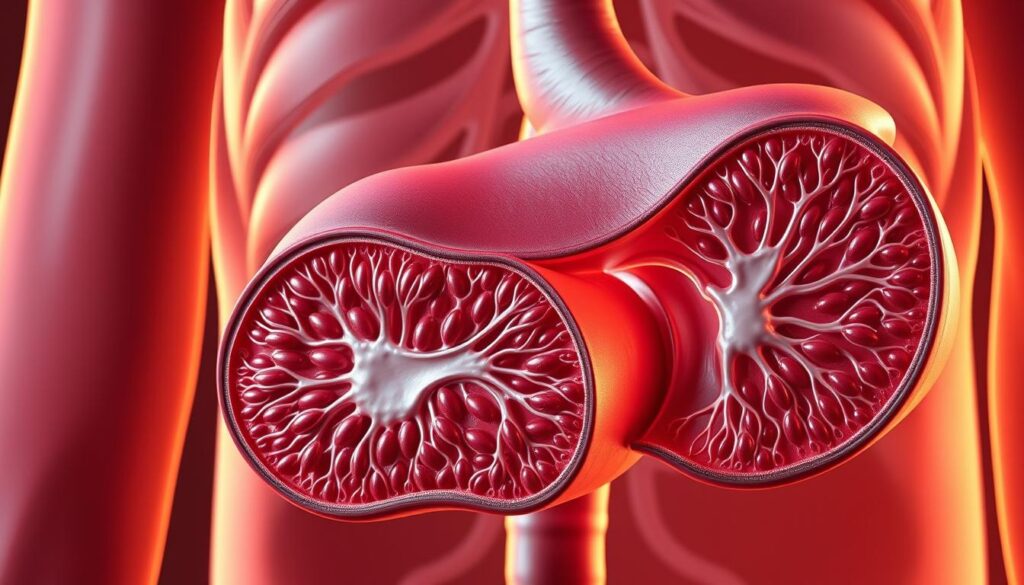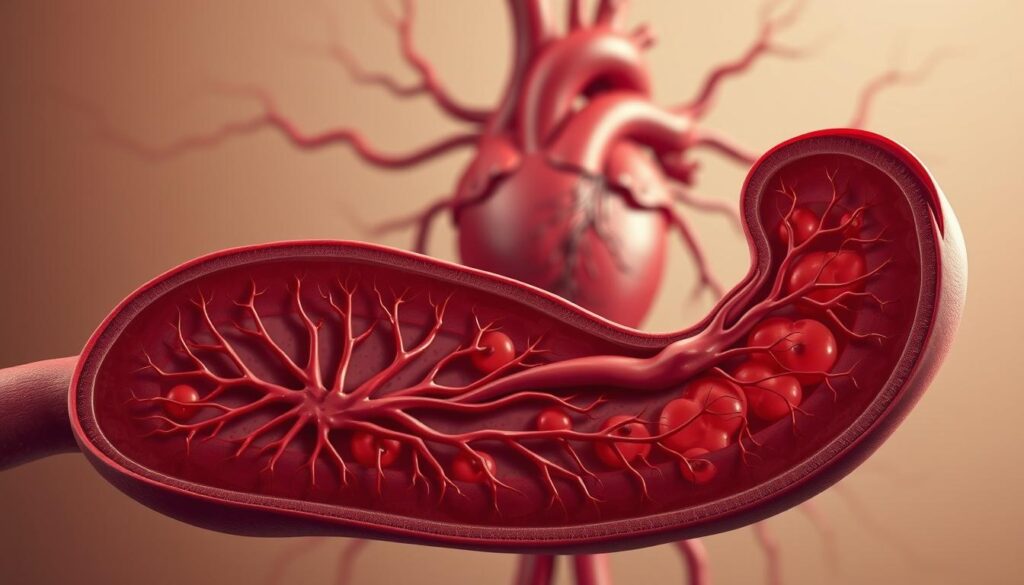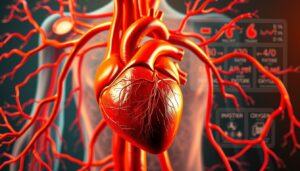Did you know your spleen is a hidden hero of your immune system? It works quietly to keep you safe from infections and clean your blood. This small organ is key to your health, but many don’t realize it1.
The spleen is the biggest lymphatic tissue in your body, tucked under your left rib cage2. It’s a vital part of your immune system, filtering blood and storing cells that fight off infections1. A 2009 study found that the spleen stores monocytes, which are crucial for fighting infections and fixing tissues1.
Your spleen acts like a security checkpoint for your blood. It removes old and damaged blood cells, catches harmful bacteria, and helps your body fight off infections. Interestingly, about 20% of people have an extra spleen, and 40% have more than two1.
Key Takeaways
- The spleen is a crucial organ for blood filtration and immune defense
- It stores essential cells that fight infections and repair tissues
- Some individuals have multiple spleens
- The spleen plays a vital role in removing damaged blood cells
- It is the largest lymphatic tissue in the human body
Understanding Your Spleen’s Location and Structure
Your spleen is a fascinating organ deep in your belly. It’s key to your health. Located in the upper left of your abdomen, it’s often overlooked3. It’s about the size of a fist, sitting behind your stomach and under your diaphragm3.
Physical Characteristics of the Spleen
The spleen’s design and function are amazing. It’s about five inches long, three inches wide, and one and a half inches thick. A healthy spleen weighs around six ounces3. Its purplish color and soft, spongy texture make it stand out.
Location and Neighboring Organs
The spleen is close to important organs. It works with your digestive and circulatory systems. It’s near the:
- Stomach
- Pancreas
- Left kidney
- Diaphragm
Functional Positioning
The spleen’s spot is perfect for its job. About 4% of your blood goes through it at any time3. This lets it filter blood and protect your immune system.
| Characteristic | Typical Measurement |
|---|---|
| Length | 5 inches |
| Width | 3 inches |
| Thickness | 1.5 inches |
| Weight | 6 ounces |
Knowing about your spleen’s structure shows its vital role in your health and immune system.
From Blood Filter to Immune Booster: The Surprising Roles of Your Spleen
Your spleen is a small but mighty organ. It filters your blood and supports your immune system. This organ works hard to keep you healthy and safe4.
The spleen filters out old and damaged red blood cells. It uses special cells called macrophages to destroy these cells. This keeps your blood clean and efficient4.
- Filters out damaged red blood cells
- Stores iron for future hemoglobin production
- Supports overall blood health
Your spleen also helps your immune system. It makes lymphocytes to fight infections and protect you from harmful pathogens4. These white blood cells are key to your body’s defense.
Your spleen is like a silent guardian, working behind the scenes to keep your body healthy and resilient.
People without a spleen need to be extra careful. They are more at risk for infections. They might need special vaccines and antibiotics to stay safe4.
| Spleen Function | Key Role |
|---|---|
| Blood Filtration | Remove damaged red blood cells |
| Immune Support | Produce lymphocytes to fight infections |
| Iron Storage | Recycle iron for hemoglobin production |
Learning about your spleen’s roles helps you see its importance. It’s a small but vital part of your health4.
The Spleen’s Role in Blood Filtration
Your spleen is like a quality control center for your blood. It filters your blood to keep you healthy5. About 4% of your blood goes through it at any time, making sure your blood stays in top shape.
The spleen checks red blood cells for quality and function5. Red blood cells live in your blood for about 120 days before they wear out. The spleen tests them to make sure only healthy cells stay in your blood.
Red Blood Cell Quality Control
Your spleen uses special blood vessels called sinusoids to test red blood cells’ flexibility5. These narrow passages act like a filter, testing how well cells can squeeze through. Cells that can’t pass are removed from your blood.
- Healthy red blood cells pass through easily
- Damaged or old cells are captured
- Macrophages consume defective cells5
Iron Recycling Mechanism
When old red blood cells break down, your spleen starts an iron recycling process1. This process lets your body use iron again, helping make new blood cells and keeping your body balanced.
| Blood Filtration Process | Key Functions |
|---|---|
| Cell Flexibility Test | Remove damaged red blood cells |
| Macrophage Consumption | Break down defective cells |
| Iron Recycling | Reuse iron components |
Your spleen is key to keeping your blood healthy. It filters your blood to prevent problems from damaged cells.
Emergency Blood Storage Function

Your spleen is amazing, storing blood for emergencies. About 25% of your heart’s blood goes through it with each beat. This makes it key for managing your blood6. It has special blood vessels that can grow and shrink, holding up to a cup of extra blood when needed.
The spleen’s role is vital during stress or injury. It quickly releases stored blood to keep your heart stable. This natural system is a lifesaver for your blood flow.
- Spleen can store up to one cup of reserve blood
- Blood vessels expand and contract based on body needs
- Provides immediate blood supply during emergencies
The spleen’s blood storage is not just about how much. It also keeps blood healthy by filtering and recycling red blood cells. This reserve ensures your body has blood ready for unexpected needs, showing its vital role.
The spleen: Your body’s natural emergency blood bank
Learning about the spleen’s role in storing blood shows its complex role in health. Though often ignored, it’s a crucial part of your body’s survival plan.
The Spleen’s Immune System Functions
Your spleen is key in fighting off infections. It’s a powerful part of your immune system, working hard to keep you safe from harmful germs7.About 4% of your blood is always in the spleen, making it a vital defense tool1
White blood cells are your immune system’s main fighters8.The spleen is the biggest helper organ, helping B- and T-cells fight off threats2>. These cells work together to find and stop dangers.
White Blood Cell Production
Your spleen makes different types of white blood cells important for defense:
- Lymphocytes: Key players in antibody production
- T-cells: Responsible for cell-mediated immunity
- Plasma cells: Create targeted defense mechanisms
Antibody Creation and Infection Response
Antibody production is a complex process where your spleen makes special proteins to fight infections8.Without a spleen, people are more at risk from certain bacteria like Streptococcus pneumoniae2>.
The spleen’s immune response is complex7.It has white pulp with lymphocytes and plasma cells for fighting infections, and red pulp for blood cell health1>.
Spleen’s Connection to Cardiovascular Health

Your spleen is key to heart health, not just fighting infections. New studies show how it affects your heart’s health.
The spleen holds immune cells that help your heart work better. Monocytes, the biggest white blood cells, live in the spleen. They help fix heart damage quickly9. After a heart attack, millions of these cells rush to the damaged area9.
Heart health risks are linked to spleen health. A major study found:
- Vets without a spleen were twice as likely to die from heart disease9
- The spleen has 10 times more monocytes than the blood9
- Spleen function can affect blood pressure
This shows the spleen’s big role in heart and blood pressure health. It’s not just a passive organ. It actively helps keep your heart and blood pressure in check.
Keeping your spleen healthy can boost your heart health. It helps avoid problems with your immune and circulatory systems.
The Role of the Spleen in Metabolic Disorders
Your spleen is key in managing metabolic disorders. It does more than filter blood. Recent studies show it’s linked to obesity and insulin resistance, showing its complex role8.
Learning about the spleen’s role in health can help prevent and manage chronic diseases. It affects how your body uses nutrients and controls inflammation.
Impact on Obesity and Insulin Resistance
Obesity changes how fat tissue works, affecting immune cells. The spleen is vital in this process by:
- Regulating inflammatory responses
- Modulating metabolic processes
- Supporting immune system balance
Inflammatory Response Regulation
Your spleen controls inflammatory markers linked to metabolic disorders. Studies found it affects insulin sensitivity10. Clinical trials show interventions can improve metabolic health through spleen actions.
Metabolic Disease Prevention
Keeping your spleen healthy is important for avoiding metabolic diseases. Lifestyle choices and targeted treatments can improve its metabolic function8.
The spleen is not just an auxiliary organ, but a critical player in metabolic health.
Living Without a Spleen: Risks and Considerations
Having a splenectomy means your body must adjust to life without a key immune organ. This change can make you more prone to infections11. Without a spleen, you’re 20 times more likely to get serious bacterial diseases11.
The risks of not having a spleen are high. You could face a severe infection, known as OPSI, within two years of surgery11. Even more alarming, up to 30% of people may get a severe infection within five years11.
- Vaccination is critical for immune system protection11
- Recommended vaccines include:
- Pneumococcus
- Meningococcus
- Haemophilus influenzae type b
Without a spleen, your immune system is at a higher risk. You’re 100 to 200 times more likely to get sepsis than someone with a spleen11. Taking antibiotics can lower infection risks by up to 50%11.
Protecting your health after splenectomy requires vigilant medical care and preventive strategies.
To lower immune system risks, take these steps:
- Stay current with recommended vaccinations12
- Practice strict food safety12
- Avoid undercooked meats
- Wash fruits and vegetables thoroughly
- Prevent cross-contamination
- Maintain rigorous hygiene practices12
- Schedule regular medical check-ups
Living without a spleen is tough, but with the right care, you can lower your risk of infections11. Knowing these risks helps you stay healthy and take the right steps.
The Spleen’s Communication with Other Organs
Your spleen is more than just an organ. It’s a key player in how your body’s systems talk to each other. This is known as organ interaction and immune system communication13. It’s not just a simple organ, but a complex communication center.
The spleen acts as a messenger between different body systems. It works closely with the nervous and immune systems. This shows how complex the spleen’s role is14. Scientists found that immune cells and neurons can talk to each other through special receptors.
- Neurological signal transmission
- Immune cell messaging
- Cross-system communication mechanisms
Cytokines from immune cells can affect how neurons work. This shows a deep conversation between different parts of the body. This talk helps your body fight off infections and stay healthy13.
“The spleen is not just an organ, but a communication nexus that connects multiple biological systems.” – Immunology Research Journal
| Communication Type | Primary Mechanism | Biological Impact |
|---|---|---|
| Neurological Signaling | Cytokine Receptors | Immune Response Modulation |
| Immune Cell Messaging | Receptor-Mediated Interactions | Inflammatory Regulation |
Learning about these communication paths helps us understand how our body stays in balance. It shows the spleen’s important role in keeping us healthy14.
Common Spleen Disorders and Diseases
Your spleen can face different health issues. Knowing about these problems helps you spot early signs and get medical help fast.
Enlarged Spleen (Splenomegaly)
Splenomegaly happens when your spleen grows too big. It can be caused by many health problems:
- Viral infections
- Blood disorders
- Liver diseases
- Certain cancers
An enlarged spleen can weigh up to four pounds, which is way off from its normal size15. You might feel pain in your upper left abdomen or feel full quickly when eating.
Ruptured Spleen
A ruptured spleen is a serious emergency. It usually happens because of physical injury. Sports injuries, car accidents, or severe impacts can cause it16.
Splenic Infections
Infections can really affect your spleen. Bacterial and viral infections can cause inflammation, leading to spleen enlargement or damage17. Some big risks include:
- Bacterial invasions
- Viral complications
- Immune system challenges
If you have ongoing abdominal pain or unusual spleen symptoms, see a doctor right away.
Maintaining Optimal Spleen Health
Keeping your spleen healthy is all about supporting your immune system and living a healthy lifestyle. Your spleen is key in filtering blood and fighting off infections. So, it’s vital to take care of it16. Eating right, exercising regularly, and managing stress can help your spleen work its best12.
What you eat matters a lot for your spleen and immune system. Eat foods full of antioxidants, lean proteins, and good fats12. Foods like fruits, veggies, whole grains, and lean proteins like fish and beans are great. They give your body the nutrients it needs to fight off sickness. Also, washing your hands often and cooking food safely can lower the chance of getting sick12.
Going to the doctor regularly and keeping up with vaccines is important for spleen health. If you’ve had your spleen removed or your immune system is weak, be extra careful. Avoid foods that are high-risk and keep your hygiene strict12. By taking care of your health, you help your spleen protect you from harm16.
FAQ
What exactly does the spleen do?
Can you live without a spleen?
What is a normal spleen size?
What are signs of a potential spleen problem?
How does the spleen impact cardiovascular health?
Can diet affect spleen health?
How does the spleen filter blood?
What happens during a splenectomy?
How much blood can the spleen store?
Is the spleen connected to metabolic health?
Source Links
- Do You REALLY Need Your Spleen? – https://www.menshealth.com/health/a19522172/spleen-facts/
- The immune system – https://patient.info/allergies-blood-immune/immune-system-diseases
- The Mysterious Spleen – https://answersingenesis.org/human-body/the-mysterious-spleen/?srsltid=AfmBOopZ5XYTdxQAMf7jQCIodraUjbKACaGvz75on-D6xHbJqtO9wma2
- What Does the Spleen Do? | Children’s Pittsburgh – https://www.chp.edu/our-services/transplant/liver/education/organs/spleen-information
- The Mysterious Spleen – https://answersingenesis.org/human-body/the-mysterious-spleen/?srsltid=AfmBOop37Kqd3Npgu6vwtq86OaXcY9Ns2Ph7Sr_n4Q8An8Z6a55w7RDE
- Parts of the Immune System – https://www.chop.edu/vaccine-education-center/human-immune-system/parts-immune-system
- The Mysterious Spleen – https://answersingenesis.org/human-body/the-mysterious-spleen/?srsltid=AfmBOop12TO0iwgIKhDBl9A5xbUFFoJXmMAz1YetTbBJ4IQUvEheZa1J
- Frontiers | Splenectomy Alters Distribution and Turnover but not Numbers or Protective Capacity of de novo Generated Memory CD8 T-Cells – https://www.frontiersin.org/journals/immunology/articles/10.3389/fimmu.2014.00568/full
- Finally, the Spleen Gets Some Respect (Published 2009) – https://www.nytimes.com/2009/08/04/science/04angier.html
- The spleen assumes a major role in blood glucose regulation in type 1 diabetes patients treated with BCG – Scientific Reports – https://www.nature.com/articles/s41598-024-67905-x
- Spleen-derived classical monocytes mediate lung ischemia-reperfusion injury through IL-1β – https://www.jci.org/articles/view/98436
- Top Foods to Avoid Without a Spleen | Nourish – https://www.usenourish.com/blog/foods-to-avoid-without-a-spleen
- The spleen: “epicenter” in malaria infection and immunity – https://pmc.ncbi.nlm.nih.gov/articles/PMC8518401/
- Meet The Spleen, The Strange Little Organ That Can Multiply – https://www.npr.org/sections/health-shots/2016/12/13/505349283/meet-the-spleen-the-strange-little-organ-that-can-multiply
- The Spleen: Do Dogs and Cats Really Need One? – The Animal Medical Center – https://www.amcny.org/blog/2023/04/12/the-spleen-do-dogs-and-cats-really-need-one/
- Frontiers | The anti-inflammatory and tolerogenic potential of small spleen peptides – https://www.frontiersin.org/journals/immunology/articles/10.3389/fimmu.2024.1449657/full
- The Spleen: A Hub Connecting Nervous and Immune Systems in Cardiovascular and Metabolic Diseases – https://pmc.ncbi.nlm.nih.gov/articles/PMC5486039/




